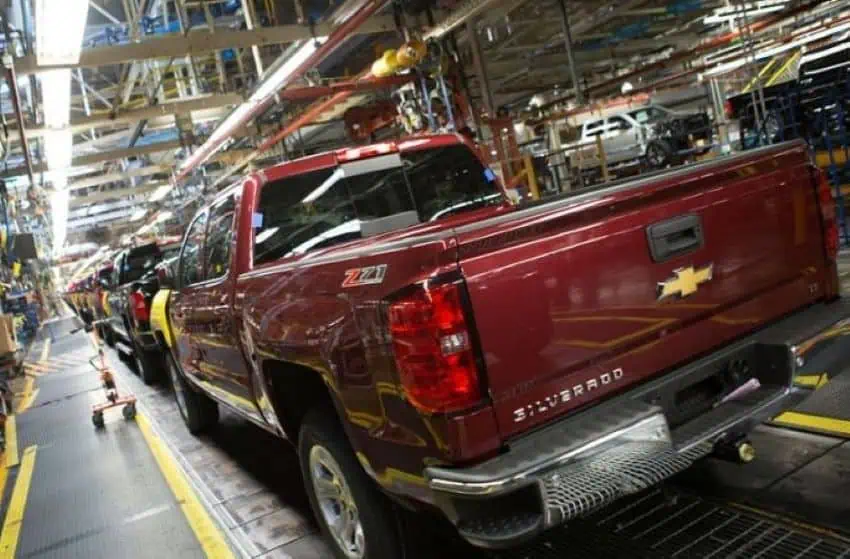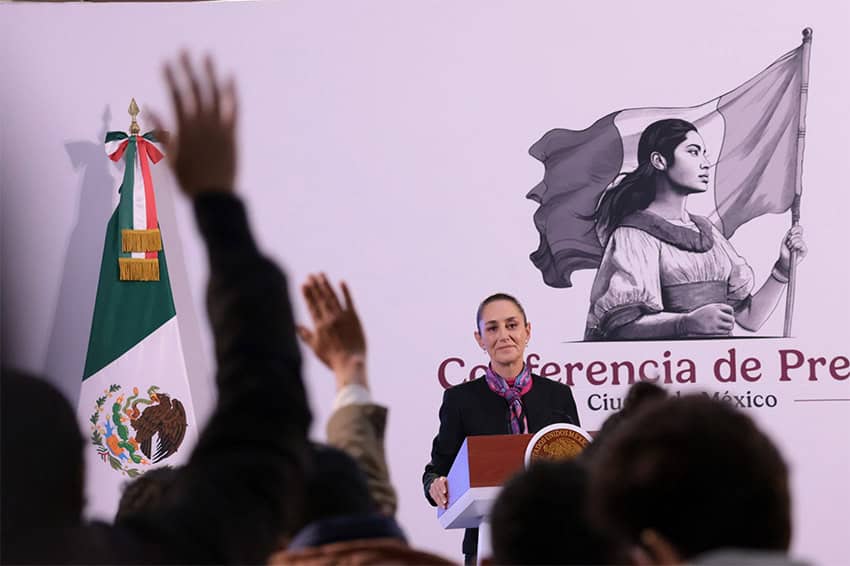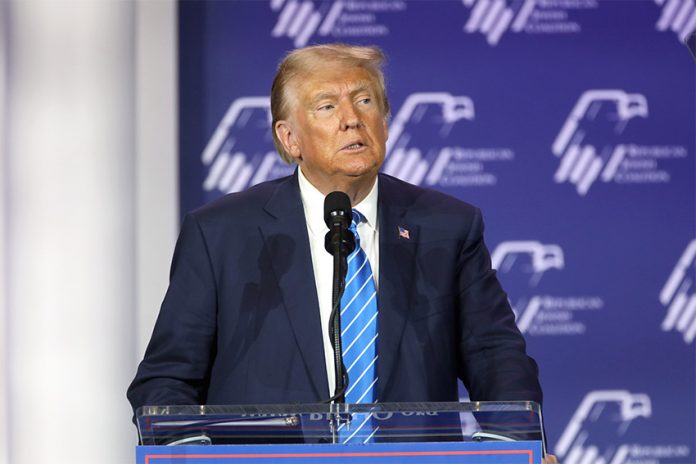Donald Trump appears determined to not just review but also renegotiate the United States-Mexico-Canada Agreement (USMCA) in 2026 if he returns to the White House next year.
In an address at the Detroit Economic Club on Thursday, the former U.S. president and Republican Party presidential candidate said that “upon taking office,” he will “formally notify Mexico and Canada of my intention to invoke the six-year renegotiation provisions of the USMCA that I put in.”

The USMCA, which replaced the North American Free Trade Agreement (NAFTA) in 2020, has a clause that stipulates that a joint review of the free trade pact will take place on the sixth anniversary of its entry into force. Thus the review will commence on July 1, 2026.
According to an article published earlier this year by Rice University’s Baker Institute for Public Policy, “the conversations” between Mexican, U.S. and Canadian officials “could involve anything from minor tweaks to threats of withdrawal unless major changes are made” to the USMCA.
“… If all three parties do not confirm their desire to extend the agreement as part of the six-year review,” Baker Institute nonresident fellow Simon Lester wrote, “they will meet again in the seventh year, and each year thereafter until the 16th year.”
“If they cannot agree by the 16th year, the agreement terminates,” Lester said.
Trump: ‘I’m going to have a lot of fun’ with the USMCA renegotiation
In the largest city of the swing state of Michigan, Trump looked back to his 2017-21 presidency — during which the USMCA was negotiated and took effect — as well as forward to what he hopes will be a second term in the White House starting next January.
The 78-year-old former president said that the review clause in the three-way trade pact “was the hardest thing I had to get” because Mexico and Canada “didn’t want that.”
“I said, ‘Nope, I want to be able to renegotiate in six years, otherwise we’re not making the deal.’ And I got it, and it’s coming due very soon. Oh, I’m going to have a lot of fun,” he said.
Trump said he wanted to protect and grow the automotive industry in the United States, which is particularly important to the economy of Detroit.

“I’ll also seek strong new protections against transshipment, so that China and other countries cannot smuggle their products and auto parts into the United States tax free through Mexico to the detriment of our workers and our supply chains,” he said.
“They smuggle this stuff in. They don’t pay anything. We’re going to have very strong language on that,” Trump said.
Less than four weeks before the U.S. presidential election, the ex-president also repeated his threat to impose tariffs on vehicles made by Chinese automakers in Mexico, a move that would require major changes to the USMCA.
“I will impose whatever tariffs are required — 100%, 200%, 1,000% — they’re not going to sell any cars into the United States with those plants,” Trump said.
The Republican Party nominee has previously expressed particular concern about Chinese automakers’ plans to open plants in Mexico, but he has also said that he will “put a 100% tariff on every single car coming across the Mexican border.”
Such a tariff would hit vehicles made in Mexico by U.S. automakers such as General Motors and Ford.

Despite his stated intention to renegotiate the USMCA, Trump said that the agreement was a “great deal” already.
“I terminated NAFTA. That’s a pretty big thing. A lot of people said it would be impossible to do. I got it done, and we have a great deal now,” he said.
“What we have to do is make it much better even, and we’ll be able to do that very shortly,” Trump said.
Harris would also like to make changes to the USMCA
The Democratic Party’s presidential candidate, Vice President Kamala Harris, pointed out on social media last month that she was “one of only 10 senators to vote against USMCA.”
“I knew it was not sufficient to protect our country and its workers. Many who voted for this deal conditioned their support on a review process, which, as president, I will use,” she wrote in a post to X on Sept. 26.
Harris, who as a senator contended that the USMCA’s environmental provisions were “insufficient,” also said on X on Sept. 26 that “American workers deserve a leader who keeps their promises and stands with workers when it matters.”
“I will bring autoworker jobs back to this country, and create an opportunity economy that strengthens manufacturing, unions, and builds prosperity and security for America’s future,” she wrote.
“… Trusting Donald Trump again is a risk America’s autoworkers cannot afford.”
Sheinbaum: The USMCA is ‘indispensable’
President Claudia Sheinbaum was asked at her Friday morning press conference about the impact a renegotiation of the USMCA with Trump as U.S. president will have on Mexico.
Without directly responding to that question, Sheinbaum noted that Trump referred “in particular” to products from China “that aren’t reported,” and agreed with the former U.S. president that “there are limitations in the current USMCA.”
The new president appeared to indicate that her government is prepared to review and renegotiate the trade pact with the U.S. government no matter who wins the Nov. 5 election.
“Whoever wins, whether it’s President Trump or Vice President Kamala, we’re going to come to an agreement,” Sheinbaum said.

“… They’re campaigning now obviously so there is greater stridency in one sense or another, but they know and we know that the agreement is indispensable,” she said.
Kimberly Clausing, an economist and senior fellow at the Peterson Institute for International Economics, told Canadian media outlet Global News that while Trump and Harris are talking tough about the USMCA during the campaign period, they might think twice about their proposals if they actually become the next U.S. president.
She questioned why they would want to make changes to “an agreement that’s basically working.”
Sheinbaum noted that the economies of Mexico, the United States and Canada are highly integrated, and asserted that the three countries don’t compete with each other but rather complement each other.
She pointed out that data recently showed that the value of Mexico’s exports to the United States reached a record high in the first eight months of 2024.
“So the United States depends a lot on Mexico, we’re the main exporter [to the U.S.],” Sheinbaum said.
Earlier this week, the head of the president’s business advisory council, Altagracia Gómez Sierra, said that Mexico is “prepared” for the 2026 USMCA review.
Trudeau: ‘We’ve been here before’
At a press conference in Laos, where he attended the ASEAN Summit, Canadian Prime Minister Justin Trudeau was asked about Trump’s USMCA remarks in Detroit as well as Harris’s plan to “renegotiate the agreement.”
“We’ve been here before. We know that there is a certain amount of protectionist sentiment in the United States right now and indeed in the world,” Trudeau said.
He said that in previous trade negotiations his government had stood up for Canadian jobs and demonstrated “how integrated” the Canadian and U.S. economies are.
“And we are ready to do it again if necessary,” Trudeau said.
With reports from CTV News, Washington Examiner, Global News, El Financiero and Milenio
